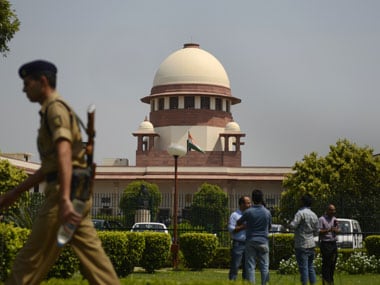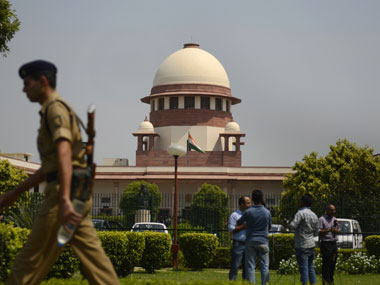The Supreme Court of India and the Narendra Modi government seemed to be deadlocked over the Memorandum of Procedure (MoP) for the appointment of judges.
The Times of India reported
on Monday that the government has proposed a secretariat to receive and process complaints against the judiciary. Although the government is working on the MoP on the directions of the Supreme Court, the two have serious differences over the terms being suggested by the government. The Supreme Court has already rejected the government’s MoP once and it seems unlikely that the two might arrive at an agreement any time soon. And even though the differences over the MoP with regard to the complaints redressal mechanism are known, the bone of contention is the process of appointment of judges by the collegiums of the Supreme Court and the 24 high courts of the country. One of the biggest roadblocks in this is the issue of what may be called “judicial dynasties” or collegiums appointing relatives, friends, former colleagues and juniors. The government is deeply concerned over this because it strikes at the very root of merit and transparency in judicial appointments. This is a known phenomenon in legal and judicial circles, despite it rarely being discussed openly. In 2013, for example, the Punjab and Haryana High Court collegium sent in the names of eight advocates for elevation to the high court. The high court collegium, comprising the then chief justice (now Supreme Court judge) AK Sikri and Justices Jasbir Singh and SK Mittal, recommended the names of eight advocates for judgeship. [caption id=“attachment_2900770” align=“alignleft” width=“380”] Representational image. AFP[/caption] Those recommended for elevation included Manisha Gandhi (daughter of former chief justice of India AS Anand), Girish Agnihotri (son of former justice MR Agnihotri), Vinod Ghai, BS Rana (former juniors of justice SK Mittal), Gurminder Singh and Raj Karan Singh Brar (former juniors of Justice Jasbir Singh), Arun Palli (son of former justice PK Palli) and HS Sidhu (additional advocate-general in Punjab). Soon after the collegium cleared these names, around 1,000 advocates sent in a signed memorandum to President Pranab Mukherjee, the prime minister and the chief justice raising serious questions about it. The memorandum stated:
Representational image. AFP[/caption] Those recommended for elevation included Manisha Gandhi (daughter of former chief justice of India AS Anand), Girish Agnihotri (son of former justice MR Agnihotri), Vinod Ghai, BS Rana (former juniors of justice SK Mittal), Gurminder Singh and Raj Karan Singh Brar (former juniors of Justice Jasbir Singh), Arun Palli (son of former justice PK Palli) and HS Sidhu (additional advocate-general in Punjab). Soon after the collegium cleared these names, around 1,000 advocates sent in a signed memorandum to President Pranab Mukherjee, the prime minister and the chief justice raising serious questions about it. The memorandum stated:
“Independence and integrity of Indian judiciary has been put at stake by the collegium of Punjab and Haryana High Court while recommending the names of advocates for elevation as judges. The reason for recommending such names puts a big question mark on the decision of the collegium which seems to have based (them) on considerations other than merit and integrity of the candidate… It has now become a matter of practice and convenience to recommend the names of those advocates who are the sons, daughters, relatives and juniors of the former judges and chief justices.”
The memorandum pointed out serious deficiencies in the selection as in the case of Manisha Gandhi “whose sole qualification is that she is daughter of former CJI AS Anand. She has appeared in only 36 cases in the year of 2012. Among them two were CRMs, eight were CWPs and other 26 were company appeals. In 2013 she appeared only in seven company appeals, till today. Recently she was appointed additional advocate-general of Punjab and Haryana High court so that she could be considered for elevation by the collegiums.” The fact that Justice SK Mittal was part of the high court collegium and still recommended persons directly linked to him raised serious issue of conflict of interest and propriety. Following the uproar, the Supreme Court rejected six recommendations and returned the names of Palli and Sidhu for reconsideration. The most recent case of alleged nepotism in judicial appointments has emerged from Allahabad High court. According to a Times of India report published on 9 June, the Centre put on hold the appointment of 44 judges for the Allahabad High Court, sent to it by the high court collegium in April. At least seven of the 44 names recommended were related to serving or retired former judges of the court. Although it’s been knocked out of the process of judicial appointments by virtue of the Supreme Court judgement in the National Judicial Appointments Commission (NJAC) case, the Central government wants to ensure the process to eliminate nepotism in judicial appointments. Eminent constitutional expert, Professor Upendra Baxi, currently emeritus professor of Law in Development, University of Warwick, told Firstpost, “You and I don’t know what the facts are. Either the allegations are manifestly true or something that need to be proved. However, those being part of collegium should not recommend for elevation names of their children or those who are close to them or have worked almost continuously with them. Beyond that one cannot be disqualified for the appointment just because he comes from a family of judges or eminent lawyers. Ideally in high courts they should judge the members of bar or district judges on the basis of merit. Selection is collegium’s prerogative and selection calls for certain amount of discretion. The question is that what method you will adopt to ensure fair treatment. Even if you ensure maximum fair treatment, the element of choice will remain.” On how to avoid bad appointments, Baxi said, “The chief justice in a state is now from outside the state because of the transfer policy justified initially as promoting national integration. But chief justices from other states do not usually know the bar well. They rely upon the information provided by other justices who are originally from the same state. In case of appointment of judges how the chief justice overcomes these limitations is a question that needs to be answered. In case of appointment of justices the rules provide that government must verify the credentials of the person whose name is proposed. In this respect, the Intelligence Bureau (IB) plays an important role. The justices only ascertain the competence of the judge and they recommend a name. If IB report has some adverse remarks, I feel the CJI and the collegium will take necessary action. After all, in case of adverse remark, the president and CJI, as exalted constitutional functionaries of the country, will surely deal with the matter seriously and not casually”. Anupam Gupta, senior advocate, Punjab and Haryana High Court, was scathing in his criticism of the judiciary with regard to nepotism in judicial appointments. “I am totally opposed to the appointment of judges’ relatives as judges. Inbreeding and nepotism has long been the bane of the Indian judiciary all over the country. The problem is truly endemic and pan- India and very little, if at all, has been done by the judiciary to mitigate it. The 2015 NJAC judgement of the Supreme Court conveniently steers clear of the problem. The judgment stretches the ‘conflict of interest’ principle (in relation to the executive participation in judicial appointments) far beyond any known jurisprudential boundaries but turns a blind eye to the problem within the judiciary itself. It is definitely a brave judgement but only politically, not morally. Unless and until judges cleanse themselves, judicial independence will lack a truly firm foundation. The first effective step towards such cleansing is a prohibition on judges’ relative being appointed as judges. The prohibition should cover all sitting judges (of high courts and also the Supreme Court) and retired judges for up to a certain period after their retirement (say, 10 years). The prohibition should be complete and allow of no exceptions.” He added, “Judges’ relatives who are professionally competent should continue to enrich the bar without any sense of loss over denial of an inheritance that is but feudal. Rather than wrangling over the MoP, let the Government of India move a Constitutional Amendment to effectuate this prohibition. For all my naivety, I doubt very much if the Supreme Court would have the moral confidence to strike it down.” Another constitutional luminary, Soli Sorabjee, too, admitted there is a problem: “It is true that there can be some cases of nepotism. If the collegium finds some substance in them they will surely review the decision. But the final word regarding the appointment should rest with the collegium and not the government; otherwise there will be lot of complications.” Sorabjee, however, is against a blanket ban on appointment of relatives. “Just because someone is related to a judge, he or she cannot be disqualified. The collegium should take other inputs too. I am not saying that other inputs should be completely neglected but after taking into account if the collegium maintains it decision, then it has to be accepted.” He further added, “I do believe that government should have a voice in appointments but not veto. The ultimate authority should rest with judiciary. If there is a clear case of nepotism then surely make a representation to collegiums and trust that they will address the issue. The government should have say in appointments to the extent of bringing material to collegiums which the collegium would otherwise have no accessed to. But they (the government) cannot say that we have brought to your notice this fact and now you have to accept it.” When asked whether he thought that the collegium is a perfect system, Sorabjee replied, “This is the least imperfect system. It may not be perfect system but we cannot mistrust it. Get the politicians or legal community into appointments and there will be big problem.” And yet, there is no denying that family is an important factor in judicial appointments and inbreeding and nepotism are facts. Consider this: Around 15 judges of the Allahabad High Court come from families of judges. This is not to suggest that they lack credentials but just to state that like in politics and the film world, families rule the roost here as well. Indira Jaising, senior advocate, Supreme Court, minces no words in admitting that strong ‘lobbies’ exists that promote nepotism. “The appointment of judges to constitutional courts or indeed to any court needs to be totally transparent, to be truly considered independent. A judiciary which claims independence from the executive must also be independent from vested interests and powerful cast and class lobbies. Today, I cannot say with confidence that such independence exists. The data from previous appointments shows that children of judges become judges, that even within the judiciary, lobbies exist. These lobbies are invisible but they sometimes surface during periods of tension or when critical decisions are taken. So entrenched are vested interests that even at the stage of designation of Senior Counsel the aristocracy of the legal profession gets preference,” she said. However, she added, “This does not mean that the government should act on the basis of anonymous complaints. It is the system that needs to change, that is the proposed appointment must be justified on the basis of equal opportunity to all to get into the judiciary. Nepotism destroys the judiciary; it begins with the lowest rung of the judiciary. The trick is to introduce friends and relatives at the level of district judge then get them to the high courts and then the Supreme Court.” In the continuing stand-off between the Modi government and the Supreme Court on the MoP, it remains to be seen if this very touchy issue of judicial dynasties is addressed, if at all.
)